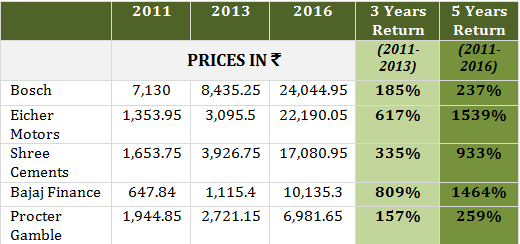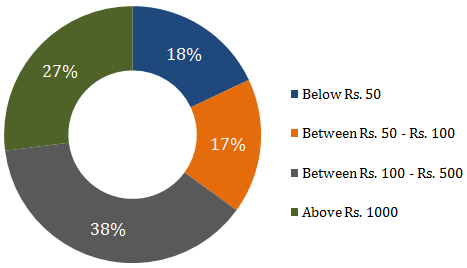Over the past few months, I have seen a lot of preference among short term investors/ traders to look for stocks falling within a certain price range for trading. To be clear, there is no best share price for range trading. Period.
Share price has nothing to do with the potential return you make on your investment, nor is their ideal price for range trading.
The quote above pretty much ends the discussion. What follows in the article below is for those who may have some interest in empirical evidence.
Over the last two months, I recommended 12 stocks to my trading clients. Here is the full table:
| Date | Stock: Recommendation Price | Target Price | Status |
| 16 June | Buy ONGC @ Rs. 211 | Rs. 260 | Open |
| 20 June | Sell Aurobindo Pharma @ Rs. 725 | Rs. 680 | Achieved on 24 June |
| Buy NTPC @ Rs. 150 | Rs. 190 | Open | |
| 24 June | Buy Axis Bank @ Rs. 500 | Rs. 540 | Achieved on 12 July |
| 27 June | Buy ICICI @ Rs. 230 | Rs. 260 | Achieved on 12 July |
| 18 July | Buy Infosys @ Rs. 1078 | Rs. 1300 | Open |
| 20 July | Buy IDFC Bank @ Rs. 51 | Rs. 58 | Open |
| 22 July | Buy Tata Motor DVR @ Rs. 329 | Rs. 360 | Achieved |
| 25 July | Buy Snowman Logistics @ Rs. 89 | Rs. 100 | Stop Loss Hit |
| 2 Aug | Buy M&M Financials @ Rs. 340 | Rs. 380 | Open |
| Buy Ashoka Buildcon @ Rs. 157.50 | Rs. 200 | Open | |
| 8 Aug | Buy TCS @ Rs. 2676 | Rs. 2900 | Open |
| 18 Aug | Buy STC India @ Rs. 114.50 | Rs. 130 | Open |
Interestingly, the maximum trading interest was generated in NTPC, followed by STC India and Axis Bank. All three of these stocks fall in the range of Rs. 100 – Rs. 500. Interestingly, hardly anyone traded or invested on the call on TCS. So do investors/ traders prefer a certain price range for trading? That sure is something for brokers to think about. I tried to dig deeper into this and posted a rather pointless question for vote:
Further, two of my clients who bought NTPC said, they invested because of the price point. Rs. 150 appeared ripe for a breakout.
To be clear, I don’t have any views on this. I believe price should have nothing to do with performance. But to the extent everyone may believe it does; it may actually have an impact, which will be most exaggerated in the short term.
It seems to me that investors have particular liking for stocks trading between Rs. 100 – Rs. 500. Particularly stocks trading between Rs. 100 – 200 (maybe I should run another poll, to super refine the range between Rs. 100 and Rs. 500).
I have no idea why or how this favoritism developed. The general view, albeit an incorrect one, is that stocks trading in this range have a better chance of multiplying.
Funnily enough stocks trading below Rs. 50 do not attract a similar kind of interest. If one believes in the base effect (i.e. that something that starts from a small base will give higher returns in percentage terms) then such stocks should be most favored, isn’t it?
Again, I don’t know if stocks in the range of Rs. 100 – Rs. 500 give the sense of both, a maturing business and a low base or it is a pure psychological thing, but for some reason, this is the range where maximum trading interest gets generated.
ABOUT PRICE POINTS
No matter how much you look at historical prices, there is nothing to suggest that stocks in any one of these ranges have any advantage or disadvantage in terms of trading OR investing potential.
Here are some stocks which traded above Rs. 500 and delivered extremely handsome returns over the last 3 – 5 years.
There are many others like Eicher Motors and Page Industries all of which have traded at high prices. Then there are the likes of Ashok Leyland which traded below Rs. 15 about 100 weeks back and reached Rs. 100 about 10 weeks back! Mind you , all these are fairly large cap in nature and not the kind of penny stocks that jump around all the time. Somehow, it may appear that stocks trading in a certain range are better for trading. Rest assured, whether for trading or investing, price range is at best – Psychological.
So instead of looking at the range in which a share is trading, focus on other valid reasons for which the price may move up or down.




